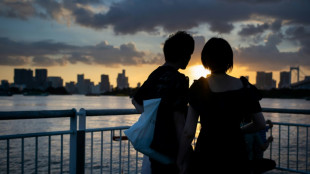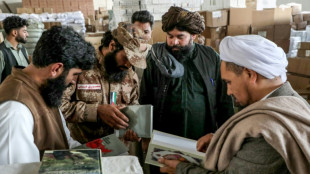

Top Jordan police officer shot dead in fuel price protests
Gunfire killed a senior Jordanian officer and wounded two other police in the country's south, where protesters have taken to the streets for days against rising fuel prices, authorities said Friday.
Colonel Abdul Razzaq Dalabeh, the deputy police chief of Maan province, was shot in the head on Thursday while officers tried to "calm down riots" in the southern town of Al-Husseiniya, the Public Security Directorate (PSD) said in a statement.
A separate statement said an officer and a non-commissioned officer "were shot while calming down 'saboteurs' who had staged riots", also in Al-Husseiniya.
Several provinces in the south of Jordan have seen strikes over the past few days. Truck drivers were the first to take action, followed by taxi drivers and then merchants, who closed their premises on Wednesday to protest higher fuel prices.
In some areas the demonstrators blocked roads with burning tyres or scuffled with security officers.
Fuel prices in Jordan have nearly doubled compared with a year earlier, particularly the diesel used by trucks and buses, and kerosene for heating.
The government has proposed relief measures including financial aid for the most-affected families.
Global crude prices are up over the past year, and the economic consequences of Russia's February invasion of Ukraine increased economic pain for already-struggling people around the Arab world.
Energy costs have led to protests in Jordan before, including in 2018 when prime minister Hani Mulki resigned after several days of rallies against proposed tax reforms and energy price increases.
The Public Security Directorate said that it protects freedom of opinion and peaceful expression but would use "appropriate" force against rioters and vandals.
"We will strike with an iron fist anyone who attempts to attack lives and public property and threatens the security of the homeland and the citizen," it said.
- Heavily in debt -
The United States, a close ally of Jordan, on Thursday said US government personnel had been restricted from both personal and official travel to the provinces of Karak, Tafilah, Maan, and Aqaba until further notice.
This was because of "reports of ongoing protests, burning tyres, and throwing stones at vehicles on streets and highways throughout Jordan and particularly in the south," the US embassy in Jordan said.
"Road closures and related security incidents are frequent and unpredictable, and emergency services are experiencing significant delays when responding to calls for help," the embassy said.
The World Bank says Jordan is heavily in debt and faces around 23 percent unemployment.
The Hashemite kingdom relies extensively on foreign aid, of which the US in September committed to provide $10.15 billion between 2023 and 2029.
In late November officials in Amman, where the two countries signed an accord, said Washington would provide Jordan with more than $845 million in annual financial support.
Around 675,000 refugees from neighbouring war-torn Syria are registered with the United Nations in Jordan. Amman estimates the real figure to be about twice that and says the cost of hosting them has exceeded $12 billion.
With multiple tensions around this part of the world, France's Elysee Palace said in early December that a regional summit would take place in Jordan "before the end of the year".
French President Emmanuel Macron is to attend, the palace said at the time after he held a phone call with Iraqi Prime Minister Mohammed Shia al-Sudani.
G.Loibl--MP




